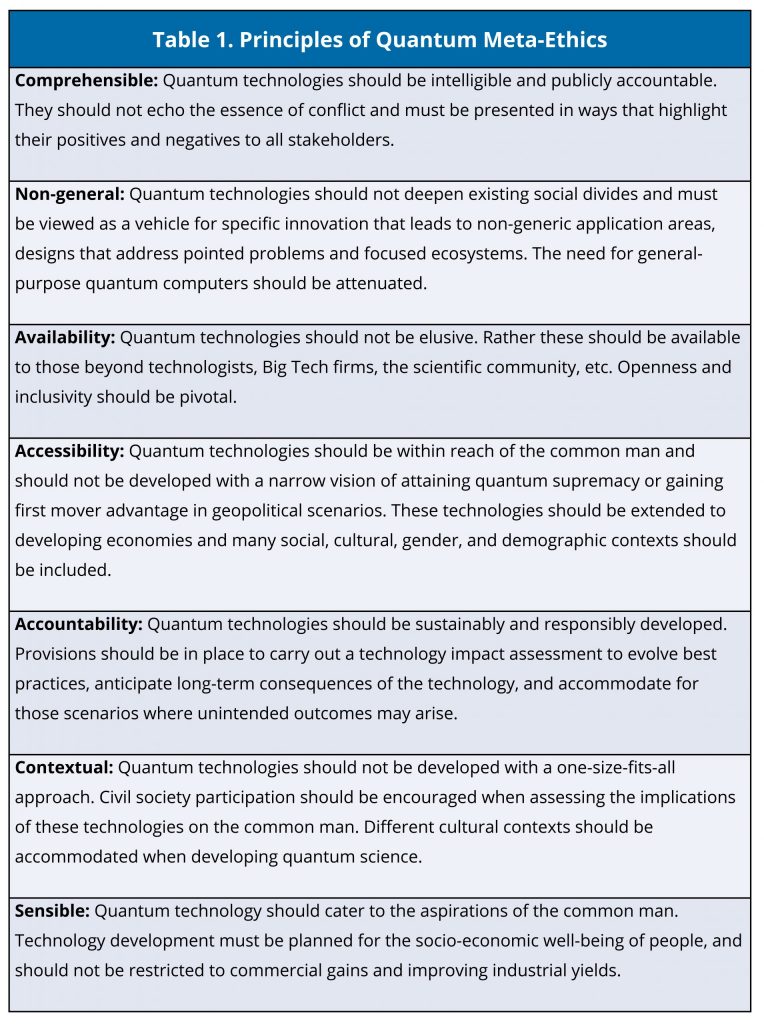Meta-Ethics Of Quantum Technologies – Analysis
By Observer Research Foundation
By Prachi Mishra
Quantum science is important to study the minutest detail of physical matter and technologies derived from it carry immense disruptive power. The atom bomb, lasers, and semiconductors are a few of the first outcomes of quantum mechanics. These technology translations accounted for the “first generation” of quantum applications. While lasers and the atom bomb were breakthroughs in the mid-20th century, the “second generation” looks at designing materials that were earlier extracted from nature to manipulate them using quantum computers.
The novelty of quantum technology makes it different from other emerging tech. It will bolster computation power, dramatically reduce processing time, and easily break into modern-day encryption. However, unlike other emerging technologies, quantum capabilities can also augment threats to national security, drastically increase the number of cyber attacks, and pose a challenge to the safe transfer of data.
From vastly studying the perils of using the atomic bomb over the course of the last century to regulating modern-day cyberspace to mitigate cybercrimes, the social, economic, legal, and ethical impact of technologies has become quintessential for global peace, security, stability, and sustainable development.
Cooperation or conflict?: What the atom bomb taught the world
The aftermath of the use of the atomic bomb continues to be pivotal in the contemporary understanding of the ethics of science and technology. Being the foremost practical application of quantum science, the lessons learnt from the use of the atom bomb can indeed be a stepping stone in evolving the ethics of quantum technologies of the 21st century. At the kernel of this learning is to know whether nation-states develop technologies for conflict or cooperation. For those who are leading the second generation of quantum computing, it becomes a matter of morality, whether they offer a helping hand to the have-nots or do they exert technological, economic, political, and psychological dominance over them. Technology leaders in the field must comprehend whether they are building on quantum science for the betterment of humanity at large or for undermining the freedom and sovereignty of others.
Whilst many multilateral organisations, conventions, treaties, and pacts have been put in place after the world wars to restrain the use of technology that may lead to catastrophic events, the world has also witnessed many aberrations. With these learnings, shaping the ethics of quantum technologies becomes the responsibility of not just the scientific community but also of nation-states, academia, civil society, and thought leaders.
A few ethical modern-day concerns
With a handful of global technology firms, like Google, IBM, and Intel, making immense strides in quantum technologies, it is highly likely that they will assert even greater dominance in global technology decisions, key technological trends, and rules which will govern their use. This could lead to more acute surveillance by these tech giants and along with other technologies, such as Artificial Intelligence (AI) and the Internet of Things (IoT), they can easily expand on their oligopolistic behaviour. The same could also be applied to nation-states. With the development of quantum computing, the ability of certain nations to massively scale surveillance of their own people and deploy a variety of technical measures to monitor them will also increase exponentially.
Another major ethical issue that comes with the use of quantum technology is its ability to hack into classical cryptography easily. Countries like China and the United States (US) which have made significant progress in building a quantum computer and testing several applications have an edge over other nations. A conventional desktop PC or any other handheld device will not be able to withstand cyber attacks launched from a quantum computer. This puts the data of billions of people at risk, undermines the tech sovereignty of hundreds of countries, and leaves national secrets vulnerable. While quantum-resistant algorithms are underway, a key concern arises about the information that is already present on the cloud, thousands of internet-enabled devices, storage devices, and millions of servers that have a colossal amount of data saved on them. What will adversaries do with quantum computing capabilities on this volume of data is a question that falls under the ambit of global discourses on quantum ethics. With cases of deep fakes on the rise, quantum technologies are only going to exacerbate the problem.
Challenges of similar nature plague scientists in all other fields as well. For instance, for biologists, when quantum computers become mature enough to manipulate genetic sequences, how must the fairness and morality of those experiments be ensured? And for a social scientist, quantum applications should not be elusive and must never propel societies toward a wider economic gap. Similarly, concerns around equitable access to quantum internet, and prevention of monopolisation of quantum computation, whilst ensuring there is sustained technological progress will need to be explored. As most of them would argue, these discussions should grow in tandem with technological development.
Cardinal rules for shaping quantum meta-ethics
Against this backdrop, there is a need to lay down rules, accords, frameworks, and guidelines for the ethical, legitimate, and moral use of quantum technology. At the most widely accepted level, the normative principles of ethics can be extended to quantum technologies as well. These include its equitable and fair use, benevolence and benign translations of technology, and sustainability. A few principles have been listed in Table 1.
In addition to these generic ethical principles, meta-ethics of quantum technologies will need to be attuned to the underlying laws that govern quantum science, such as superposition, tunnelling, and entanglement. For instance, when quantum computing is used with machine learning algorithms on quantum datasets, the nature of outcomes is going to vary from the classical results, posing ethical concerns. Therefore, frameworks that align with the very nature of quantum science will need to be put in place.
Who will frame the ethical accords?
Whilst framing ethical accords for the use of quantum technologies, physicists, scientists, and academicians who are experts in the field should be awarded the role of decision-making. Quantum technologies should abide by the standard rules of ethics and legality, and the conventions laid down by the scientific community should also be highly regarded. Since quantum applications and quantum data will be different from traditional applications and data, ethical frameworks specific to those application areas could also be evolved. For instance, guidelines for healthcare could vary from those laid down for financial markets. For regulating quantum technologies, nation-states must use a cross-disciplinary approach where evidence-based technology policy-making is used along with social sciences and natural sciences.
Nation-states can leverage global platforms (such as G20 and regional multilateral groupings like the QUAD) to initiate and mature discussions on the ethics of quantum technologies in a fashion similar to existing technologies like AI and machine learning. Similarly, coalitions and task forces that have been set up by multi-stakeholder ecosystems comprising governments, industry associations, and intergovernmental organisations such as the United Nations for emerging technologies, can be modelled for quantum technologies too. These will act as holistic systems which can provide for both, the standard ethical guidelines and those which are context-specific.
Other than these, focused projects and initiatives in academia and civil society organisations can play a significant role in shaping global as well as contextualised discourses on quantum technologies. For instance, the Quantum Ethical, Legal, Social, and Policy Implications (ELSPI) project, which is a joint initiative of Stanford University and Oxford University, or the Quantum Meta-Ethics Project, which is a collaborative effort of the University of Sydney and the Observer Research Foundation, have produced literature and other intellectual resources to explore the implications of quantum technologies on societies at large. They also facilitate knowledge exchange across different communities and ensure the participation of civil society.
Concluding remarks
Quantum meta-ethics and accords should not be seen as an obstacle to new technological development and innovation. Rather, they should pave the way for inclusive technology translations that are for the benefit of humankind. These frameworks should be adopted by all factions of the quantum multi-stakeholder ecosystem, including the quantum scientific community. Framing rules and guidelines to this end will indeed be onerous as it will require bringing social sciences, philosophy, and pure sciences together.


